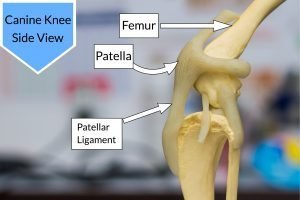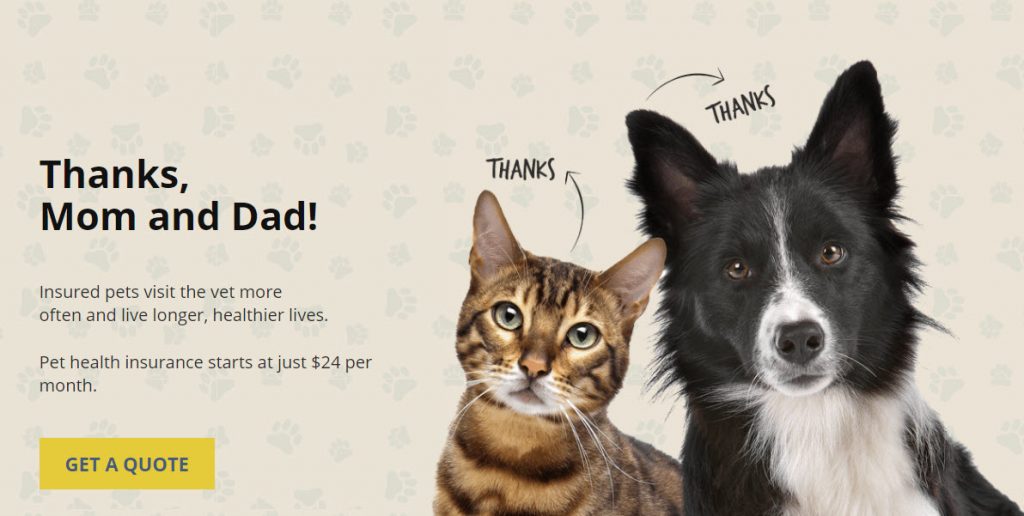Patellar Luxation in Dogs
Free Pet Insurance Comparison
Compare Quotes From Top Companies and Save
Secured with SHA-256 Encryption
Dr. Pippa Elliott BVMS, MRCVS
Veterinarian
Dr Pippa Elliott BVMS, MRCVS is a veterinarian with over 30 years of experience in companion animal practice. In 1987 she graduated from the University of Glasgow, with a degree in veterinary medicine and surgery. She works at Blythwood Vets and the People’s Dispensary for Sick Animals (PDSA). Pippa is an advocate of Fear-Free Practice, an animal addict, and a veterinary writer. She is also w...
Veterinarian
UPDATED: Jan 8, 2024
Pet Insurance U receives compensation from the third parties included on this site. This includes payment for clicks from our site to insurance providers’ sites and quote requests generated. Our rankings and reviews are not affected by payments from the insurance companies. The compensation we receive allows the site to be free and regularly updated. Our goal is to review every pet insurance provider, but not all companies are listed on the site.
And many of the companies we review do not pay us anything. We simply rate, compare and review their plan because we feel it will be valuable to you. Our reviews are guaranteed to be unbiased, professional and advertising compensation does not influence rankings.
We are a free online resource for anyone interested in learning more about pet insurance. Our goal is to be an objective, third-party resource for everything pet insurance related. We update our site regularly, and all content is reviewed by pet insurance experts.
UPDATED: Jan 8, 2024
Pet Insurance U receives compensation from the third parties included on this site. This includes payment for clicks from our site to insurance providers’ sites and quote requests generated. Our rankings and reviews are not affected by payments from the insurance companies. The compensation we receive allows the site to be free and regularly updated. Our goal is to review every pet insurance provider, but not all companies are listed on the site.
And many of the companies we review do not pay us anything. We simply rate, compare and review their plan because we feel it will be valuable to you. Our reviews are guaranteed to be unbiased, professional and advertising compensation does not influence rankings.
On This Page
Patella luxation in dogs is a very common muscular disease that affects the dog’s kneecaps or patella.
A dog’s kneecap fits right into the femur bone, and when a dog walks or moves, the kneecap will slide up and down.
When a dog has a luxating patella, this means that the kneecap has become dislocated and doesn’t slide freely in the femur.
Table of Contents:
Need Pet Insurance?
FACT: Pet insurance pays up to 90% of vet bills when your pet is sick or injured!
There Are Two Types Of A Luxating Patella
- Medial – When the patella is sliding on the inner part of the knee (most common)
- Lateral – When the patella is sliding on the outer part of the knee
Enter your ZIP code below to view companies that have cheap pet insurance rates.
Secured with SHA-256 Encryption

4 Grades Of Patella Dislocation
Your veterinarian will be able to determine the severity of the patella injury through X-rays:
Grade 1
The patella will slide out at times but then can pop back in spontaneously. There is little pain.
Grade 2
The patella tends to slide out occasionally but can be put back into the correct position manually and your dog can feel this grade.
Related: 10 Things You Must Know Before You Buy Pet Insurance
Grade 3
The patella is out of place most of the time but can be manually put back into the correct position but your dog will be in pain.
Grade 4
The patella is permanently out of place and can’t be put back into the correct position.
Your dog might even look bow-legged and is constantly in pain.
Real Cost Savings from PetFirst Clients

Luna
PetFirst saved his parents
$6,712
A happy energetic Luna one morning couldn’t hold her food down. After months of multiple costly vet visits to specialists and an endoscopy, the problem was discovered and fixed. Luna put 22 pounds back on in no time and her parents were grateful for having PetFirst by their side to pay the bills.
Common Symptoms Of Patella Luxation
- A popping sound in the dog’s kneecap
- Abnormal walking or limping
- Avoidance of using the affected leg
- Constant Pain
Breeds More Susceptible To luxating Patella
Typically luxating Patella is an issue in smaller breeds such as:
- Chihuahuas
- Pekingese
- Miniature poodles
- Lhasa Apso
- Yorkshire and Boston Terriers
- Cocker Spaniel
- Papillon
Larger Breeds With Possible Patella Luxation Injuries:
Enter your ZIP code below to view companies that have cheap pet insurance rates.
Secured with SHA-256 Encryption
What Causes Knee Dislocation
There are a few reasons why dogs will have luxating patella issues:
Pre-Disposed Genetics
Some skeletal deformities that are present and birth (congenital) can cause luxating patellas and the most common of these pre-existing conditions is when the quadriceps muscles are out of alignment or the femur is not set in place properly.
Poor Nutrition
Dogs who are not fed well and/or are overweight are more prone to developing knee and joint problems due to the excess weight.
Surgical Treatment For Luxating Patellas
There are different forms of treatment for luxating patellas depending on the severity of the patella injury.
For the more severe or grade 3 or 4 patella issues, surgery is the most common treatment.
There are typically 3 different surgeries performed depending on where the abnormality has occurred:
#1 – Trochlear Groove Needs To Be Deepened
The groove where the patella is located needs to be deepened so it can hold the patella.
This is usually done with a trochlear wedge or blocking the trochlear.
#2 – Quadriceps Realignment surgery
The purpose is to realign and move the tibial crest towards the bone to reposition the patella so that it is properly aligned within the trochlear groove.
Pins are typically used to secure the bone.
#3 – Femur Corrective surgery
The patella and the surrounding areas that are misaligned causes the femur to twist. The femur needs to be properly aligned.
Patellar Luxation Treatment Without Surgery
If your dog has grade 1 or 2 patella luxation, surgery may not be required.
The most common treatment for luxating patellas that is non- surgical are:
Knee Braces
Dog knee braces can help keep the patella in place and help minimize your dogs’ pain.
Supplements
Many vets recommend supplements that help bone growth and are usually antioxidants and glucosamine.
Patella Massage
By massaging the dog’s knee joint, you can help the patella move back to the correct position.
Your vet can give you tips on how to massage the patella which can help mobility and ease the pain.

Enter your ZIP code below to view companies that have cheap pet insurance rates.
Secured with SHA-256 Encryption
What Is The Cost Of Luxating Patella Surgery?
When considering the cost of luxating patella surgery, it is not only the surgery that costs money but also the post-operation care.
Rehab, more vet visit follow-ups, prescription medication, and even physiotherapy will factor into the price.
The cost will typically range from $1,500 to $3,000 depending on the type of surgery required and other factors such as where you live or the grade of the patella issue.
Also, the prescription medications that are needed can add up too and could be as much $40 a month.
Does Pet Insurance Cover Luxating Patella?
Yes, but you need to insure your dog while he or she is young and before any patella issues occur.
If you have a breed that is prone to luxating patella issues, pet insurance will help offset the costs of any surgery or issues that might occur later in life.
Pet insurance can save you up to 90% of each bill and can help reduce the monthly price of prescriptions.
And the best insurance companies, like Healthy Paws, even include alternative treatments like hydrotherapy that can help with the costs of post-op treatment.
Fetch Rates With Healthy Paws!
Complications With Luxating Patella Surgery
As with any surgery, there is always the risk of complications. Infection is typically the most common complication.
And, of course, the more advanced the surgery, the higher the chance that the knee could re-luxate and then need a second surgery might be needed.
It’s important to watch your dog and limit his or her activity after surgery for a successful recovery.
Enter your ZIP code below to view companies that have cheap pet insurance rates.
Secured with SHA-256 Encryption
Recovery For A Dislocated Kneecap


With proper care and exercise, dogs can generally recover within 6 to 8 weeks and begin normal exercise.
Some tips to help for a successful recovery:
- Avoid Exercise and Activity – your dog needs time to recover and keep walking to a minimum.
- Hydrotherapy – By letting your dog swim and exercise in the water, it enables your dog to exercise without pressure on the joints.
- Diet – Make sure your dog has a good high-quality diet with plenty of vitamins and minerals.
How To Mitigate Patella Luxation In Dogs
There really is no way to avoid patella luxation in dogs, particularly for those dogs that are prone to it.
Of course, if you have a breed that is susceptible to patella luxation, make sure to keep your dog at a healthy weight and keep up with a healthy diet.
And make sure to consider pet insurance to save costs now and later in your dog’s life!
Dogs can live a long happy, life even with patella luxation and the condition has a 90% success rate of being and remaining treatable.
For more information on common Dog Health Problems such as arthritis, cherry eye, and many more.
Other articles you may find helpful:
Is Exotic Pet Insurance Necessary?
The Best Pet Insurance By State
Fun Facts, Dog FAQ, And Unsolicited Dog Advice
5 Training Commands to Save Your Dog’s Life
The Ultimate Guide to Safe Foods for Dogs
We get it, your dog is like your child and when your puppy or dog has health problems it is scary. Luckily there is pet insurance companies that will help you pay for any veterinarian care they made need. Checkout the best puppy and dog pet insurance companies and learn about common puppy health issues and ailments in older pets.
Common Health Problems:
Chronic Active Hepatitis in Dogs
Cruciate Ligament Tear in Dogs
Degenerative Myelopathy | Spinal Cord Disease In Dogs
Dementia in Dogs | Canine Cognitive Dysfunction
Dog Comedones (Schnauzer Bumps)
Dog Diarrhea: What Can You Do To Help?
Gallbladder Obstruction in Dogs
Heart Murmurs In Dogs | How To Identify Them
Intervertebral Disc Disease In Dogs
Nasal Solar Dermatitis In Dogs
Progressive Retinal Atrophy In Dogs
The Dog Flu – Symptoms & Treatment for Canine Influenza
Frequently Asked Questions
What is patellar luxation in dogs, and how does it affect them?
Patellar luxation is a common muscular disease in dogs that affects the kneecaps. When a dog has this condition, the kneecap becomes dislocated, causing pain and mobility issues.
How is the severity of patellar luxation determined?
Veterinarians use X-rays to assess the severity of patellar luxation. There are four grades, ranging from occasional sliding (Grade 1) to permanent dislocation (Grade 4), with varying levels of pain.
What are the common symptoms of patellar luxation in dogs?
Common symptoms include difficulty walking, occasional limping, and, in severe cases, a bow-legged appearance. Dogs may also experience pain, especially during movement.
Which dog breeds are more susceptible to patellar luxation?
Smaller breeds are typically more prone to patellar luxation. However, larger breeds can also be affected, and genetics play a role in predisposing some dogs to this condition.
What causes knee dislocation in dogs?
Knee dislocation can result from pre-disposed genetics, where skeletal deformities are present at birth, or poor nutrition and excess weight, making dogs more prone to knee and joint problems.
What are the surgical treatments for luxating patellas?
Surgical treatments vary based on severity. Options include deepening the trochlear groove, quadriceps realignment, and femur corrective surgery. Grade 1 or 2 patellas may not require surgery.
Does pet insurance cover luxating patella surgeries?
Yes, pet insurance covers luxating patella surgeries, provided the dog is insured before any patella issues occur. Insurance can help offset surgery costs, post-operation care, and monthly prescription expenses.
What is the cost of luxating patella surgery?
The cost ranges from $1,500 to $3,000, depending on factors such as the type of surgery and location. Post-operative care, medications, and physiotherapy contribute to the overall expense.
Are there complications with luxating patella surgery?
Complications, such as infection, can arise with any surgery. The risk increases with the complexity of the procedure. It’s crucial to monitor the dog’s activity and follow post-operative care guidelines.
What is the recovery period for a dislocated kneecap?
With proper care, dogs can recover in 6 to 8 weeks and resume normal exercise. Post-operative care includes limiting activity and following vet recommendations for a successful recovery.
Can patellar luxation in dogs be prevented?
While it may not be entirely preventable, maintaining a healthy weight and diet, especially in breeds prone to patellar luxation, can help. Consider pet insurance for cost savings and alternative treatments.
How can pet insurance help with patellar luxation?
Pet insurance covers a significant portion of veterinary bills, including surgeries and post-operative care. It can save up to 90% on each bill and may include alternative treatments like hydrotherapy.
Is there any way to avoid patellar luxation in dogs?
There is no foolproof way to avoid it, but responsible pet care, regular check-ups, and maintaining a healthy lifestyle can contribute to a dog’s overall well-being.
Enter your ZIP code below to view companies that have cheap pet insurance rates.
Secured with SHA-256 Encryption
Dr. Pippa Elliott BVMS, MRCVS
Veterinarian
Dr Pippa Elliott BVMS, MRCVS is a veterinarian with over 30 years of experience in companion animal practice. In 1987 she graduated from the University of Glasgow, with a degree in veterinary medicine and surgery. She works at Blythwood Vets and the People’s Dispensary for Sick Animals (PDSA). Pippa is an advocate of Fear-Free Practice, an animal addict, and a veterinary writer. She is also w...
Veterinarian
We are a free online resource for anyone interested in learning more about pet insurance. Our goal is to be an objective, third-party resource for everything pet insurance related. We update our site regularly, and all content is reviewed by pet insurance experts.
